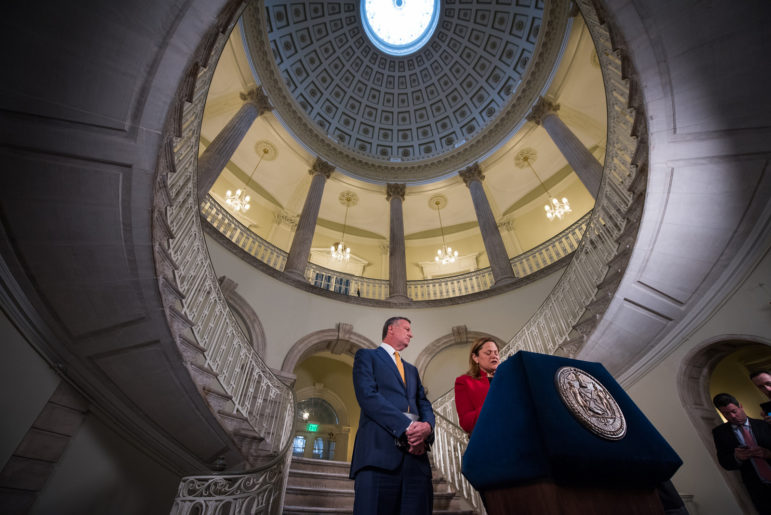
Edwin J. Torres/Mayoral Photo Office.
New York City Mayor Bill de Blasio and Council Speaker Melissa Mark-Viverito announce the closure of Rikers Island over a 10 year period on Friday, March 31st, 2017.
Amidst the splash created by Mayor de Blasio’s pledge to close Rikers, it’s somewhat surprising that there hasn’t been more attention to the future of broken-windows policing. After all, eliminating arrests for several low-level offenses is an essential component of the Lippman Commission report.
As noted in the “Rethinking Incarceration” section of the report, over 40 percent of the 250,000 arrests in NYC resulted from “low-level unlawful conduct” including subway fare evasion, low-level marijuana or other drug possession, or petty theft. In order to remove the “collateral consequences of an arrest, conviction, or jail time,” the commission recommends making the following offenses punishable only by summons: turnstile jumping, low-level marijuana in public view, prostitution and possession of gravity knives.
Such moves would produce an overall reduction in arrests by 20-25 percent. The changes in the law would need to be made in Albany. But in the meantime, the NYPD could start implementing them today.
Doing so, of course, would strike a serious blow to the foundation of the broken-windows approach that has dominated NYPD since the Giuliani era. Other than gravity knives, three of the four offenses singled out by the Lippman report are archetypal signs of the smaller disorder that yields larger crimes, in the view of former NYPD Commissioner Bill Bratton and his disciples.
But just last year, Philip Eure, inspector general of the NYPD, released a study showing that as low-level quality-of-life enforcement declined during 2010-2015, “there was no commensurate increase in felony crime” (emphasis original). Bratton and the Daily News editorial board attacked Eure’s report because it didn’t consider the previous 15 years of data. But such criticisms seem academic at this point.
The Manhattan Institute also clings dearly to its belief in broken windows, which explains why City Journal associate editor Seth Barron is sounding the alarm. The Lippman Commission, he warns, is pushing “a decriminalization agenda that would end Broken Windows policing as we know it and allow miscreants to commit quality-of-life offenses with impunity.”
Barron defends the NYPD’s current patterns of enforcement by contending that “blacks and Latinos are overrepresented in the city’s jail population because they commit a disproportionate amount of the city’s crime.” To prove what he calls an “uncontroversial point,” he links to an NYPD report that deals only with felonies and serious misdemeanors, not quality-of-life infractions.
However, research by Harry Levine and others has shown for at least one of the low-level offenses in question, marijuana, arrest patterns show clear patterns of racial bias. The same also holds true for summons enforcement, suggesting that decriminalization is no substitute for legalization.
The linkage that many activists, attorneys and others have made between low-level arrests and potential ICE deportations adds further momentum to the push to end broken windows enforcement. City councilmembers including Antonio Reynoso, Carlos Menchaca, Ritchie Torres and Rory Lancman have recently echoed that call.
But it’s really up to Mayor de Blasio to make the push for a change in NYPD policy. With Bratton gone, his biggest obstacle is out of the way, and the Lippman Commission now provides official sanction to scale-back NYPD arrests. Yet on broken windows, de Blasio sounds like a broken record, repeating the same mid-90s lyrics. It’s time that we make him sing a new tune.
Theodore Hamm is editor of Frederick Douglass in Brooklyn and chair of journalism and new media studies at St. Joseph’s College in Clinton Hill, Brooklyn.










3 thoughts on “CityViews: Lots of Talk About Closing Rikers, Not Enough About Shutting ‘Broken Windows’”
No offense i dont care what color a person is he commits a crime he should be put in jail the non criminals got to be protected if you dont want to do.the time dont do the crime however the police have to put their plans into realitymore education and programs should be added to the fray the people themselfs got to be given job oportunitysthe coalition of the rockaways bruce jacobs says if you cant do the time dont do the crime
Pingback: CityViews: Don’t Pin NYPD Pot Arrests on Community Complaints - am-se.com
Pingback: CityViews: Don’t Pin NYPD Pot Arrests on Community Complaints - lavina-jahorina.com